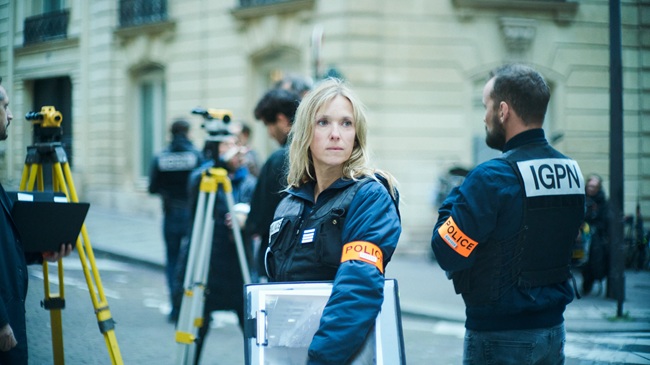Dossier 137: A Gritty Portrait of Protest and Policing in Paris
Who can forget the gripping headlines and shocking photos seen around the world? Images of Paris on fire amid “yellow vest” protests reached a fever pitch in December 2018, which is when police procedural Dossier 137 takes place. The Dominik Moll-directed film premiered at the Cannes Film Festival and is among this year’s “in competition” films.
The film was met with critical praise – as well as some controversy. Dossier 137 actor Theo Navarro-Mussy was banned from the Cannes premiere, due to rape and sexual assault allegations against him, which predate the filming of Dossier 137, its producers said. Navarro-Mussy’s Cannes ban marks the first time an actor has been banned from Cannes due to sexual assault allegations.

Dominik Moll. © Fanny de Gouville / Haut & Court
Allegations and investigations are thematic to this film. It’s December 2018 in Paris, and police are being investigated for their role in the protests by IGPN (internal affairs) investigator Stéphanie (Léa Drucker). A former cop, Stéphanie now leads investigations against her old colleagues. She becomes wrapped up in a case about a young man, only 20 years old, who sustained a severe head injury while in Paris (his first time in the city) to protest. His mother, who happens to be from the same hometown as Stéphanie, comes to her to file a report of the incident. The suspected perpetrators of the violence against the young man are none other than the French police. It’s up to Stéphanie to determine who is responsible for the violent crime.
She reviews endless footage from the day of the event, searching for clues. Devoted to her job, she has a few small pleasures outside of work, which include tending to a stray kitten she found at the parking garage of her apartment and being an attentive single mother to her teenage son, Victor.

Dossier 137. © Fanny de Gouville / Haut & Court
The young man who was injured traveled from his small town to Paris with his family to participate in the protests. His mother recounted how they parked the car on the outskirts of Paris, and just followed the Seine towards the demonstrations. The real-life grassroots demonstrations – called mouvement des gilets jaunes in French –operated weekly beginning in November 2018 and lasted until June 2020. The protests were cries against the increase in oil prices, fuel taxes, a wealth tax repeal, traffic enforcement cameras, and imposed austerity measures. With a demand list totaling 42 demands, the “yellow vest” activists wanted, among other things, an increase in France’s minimum wage, government transparency, and more.
Despite setbacks during Stéphanie’s investigation, including cops giving her the runaround, disrespecting her inquiry, and making enemies among police, she remains committed to the case and her work. When she notices a figure standing in the window in video footage from the night of the crime, she suspects she may have stumbled on the key to the case. At home, her son asks her, “Why does everyone hate the police?” Stéphanie counters the statement, saying that’s not true. Victor insists and says she doesn’t see it because she’s surrounded by police, just like his dad (Stéphanie’s ex, whose new girlfriend happens to be a copy). Her son then cites an insulting acronym being used against the police. His mom eventually concedes, and says wearily, “It’s not a likeable job.” She adds, “Enforcing the law doesn’t make you friends.”
It’s a relevant topic – the social attitudes toward law enforcement, which have become increasingly negative in recent years, especially in the United States during the Black Lives Matter movement, and in France during the “yellow vest” protests.
Dossier 137 is full of grit, suspense, and a heavy dose of reality. This police drama is gripping, and it will especially resonate with Parisians and all those who love Paris; it’s an opportunity to see the City of Light in, well, a very different – far grittier – light.
Lead photo credit : DOSSIER 137 de Dominik Moll. Photo: © Fanny de Gouville // Modds. Courtesy of Cannes Press Office
More in Cannes film festival, gilet jaune, Paris protests




